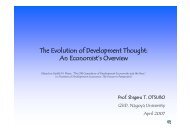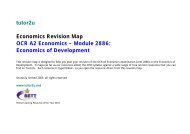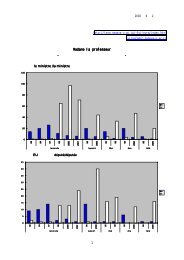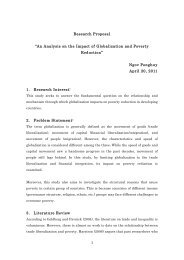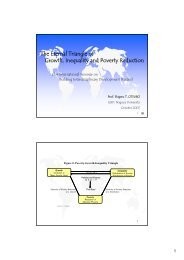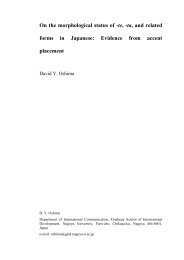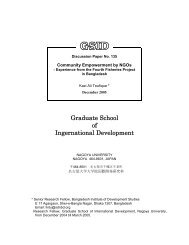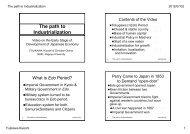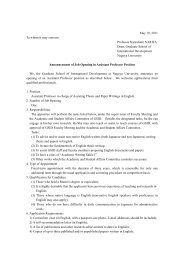Report
Report
Report
Create successful ePaper yourself
Turn your PDF publications into a flip-book with our unique Google optimized e-Paper software.
H IGHER EDUCATION SERVICES 147<br />
workers (Maldives’ TPR 2002). From the perspective<br />
of the industrialists, it is a positive development, but<br />
from a long-term economic and social perspective, it<br />
poses a major threat that needs to be addressed without<br />
affecting industry performance (The World Bank 2006).<br />
In view of the lack of educational opportunities at<br />
higher level and also due to the over dependence on<br />
expatriate labour force it could be suggested that the<br />
Maldives should undertake liberal commitments in the<br />
three education services – higher, adult and other<br />
education services and under all modes. The Maldives<br />
has strong import interest in education services. As in<br />
Bangladesh, in the Maldives also there does not seem<br />
to be any explicit problem with recognition of foreign<br />
degrees. In view of the Maldives having the highest per<br />
capita income in the region, it offers an attractive<br />
market for other South Asian countries. In this regard,<br />
India and Sri Lanka seem to be better placed to provide<br />
education services to the Maldives due to their<br />
geographical proximity and better education facilities.<br />
As India already has some educational institutions in<br />
Nepal and the Manipal University is planning to start<br />
its branch in Sri Lanka, given the demand for higher<br />
education, Indian institutions may like to be present in<br />
the Maldives. Modes 1 and 2 also appear to be important<br />
for supply of education to the Maldives by other<br />
South Asian countries. However, currently the demand<br />
for qualified teachers is very high in the Maldives and<br />
other South Asian countries can fill this gap.<br />
There is a general trend in the Maldives that for<br />
higher education students go abroad particularly to the<br />
Western advanced countries. With the support of other<br />
South Asian countries the Maldives can gain immensely<br />
by having access to relatively cheap education via Mode<br />
2 and by allowing commercial presence its students can<br />
instead study in the country thereby saving a lot of<br />
foreign exchange. Due to predominance of the tourism<br />
sector in the Maldivian economy, its main emphasis is<br />
on tourism related education which could also be<br />
provided by other South Asian countries.<br />
Bhutan<br />
Bhutan, an acceding WTO member country, has<br />
submitted its services offer to the WTO which includes<br />
education services. Bhutan’s proposed commitments in<br />
education services cover higher secondary education<br />
services (CPC 9222) and post secondary technical and<br />
vocational education services (CPC 9231). CPC 9222<br />
has been defined as general school education services<br />
at the second level, second stage. 5 Such education<br />
services consist of general education programmes covering<br />
a wide variety of subjects involving more specialisation<br />
than at the first stage. The programmes aim to<br />
qualify pupils for university entrance of higher technical<br />
or vocational education without any special subject<br />
prerequisite. Similarly, post-secondary technical and<br />
vocational education services have been defined as<br />
services consisting of a great variety of subject-matter<br />
programmes. 6 They emphasise teaching of practical<br />
skills, but also involve substantial theoretical background<br />
instruction.<br />
From the definitions of the two education services<br />
in which Bhutan has proposed to make commitments<br />
it appears that Bhutan has proposed very wise and<br />
practicable commitments as they suit the limited<br />
requirements of the small country. Moreover, at higher<br />
level and particularly for technical education large<br />
Foreign Service providers may not find the Bhutanese<br />
market big enough to invest a large amount of capital.<br />
While in the Market Access column, Modes 1 and<br />
2 have no restrictions, under Mode 3 services can be<br />
provided jointly with local educationists. In addition,<br />
foreign investor equity would be limited to a maximum<br />
of 51% and except for education services funded from<br />
state resources. Mode 4 is unbound except as in the<br />
horizontal section. In the National Treatment column<br />
Modes 1, 2, and 3 are unbound and Mode 4 is unbound<br />
except as in the horizontal section.<br />
In the horizontal section, the restrictions are limited<br />
to Mode 3. In the Market Access column the first<br />
limitation specifies that in order to establish a new<br />
commercial presence in Bhutan, minimum size of<br />
foreign investment would be $0.5 million and foreign<br />
investor’s equity holding limited to 70% and business<br />
must also be incorporated in Bhutan. Further, the investment<br />
shall be governed by sector specific policies and<br />
procedures as established in the sectors included in this<br />
schedule. Mode 3 is unbound for measures regulating<br />
publicly funded services including with respect to<br />
national treatment. In the National Treatment column<br />
also there are some limitations. Foreign investors are<br />
required to foster transfer of technology, introduction<br />
of management skills and provide training and employ<br />
Bhutanese national at all levels in the enterprise. Finally,<br />
the shares held by foreign nationals and juridical<br />
5<br />
United Nations Statistics Division, Department of Economic and Social Affairs, the United Nations, http://unstats.un.org/<br />
unsd/cr/registry/regcs.asp?Cl=16&Lg=1&Co=92220, last visited on 12 November 2007.<br />
6<br />
Education Services: Background Note by the Secretariat, WTO, S/C/W/49, 23 September 1998.




